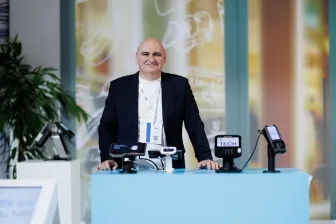The evolution of the next generation of payment terminals has seen the Android operating system emerge as the front runner in the race for innovation. But what are the drivers for this momentum, and why is Android gaining traction?
Hernán Moya, Marketing Director, Iberia for Terminals, Solutions & Services at Ingenico, considers four key reasons why Android is making such a significant difference in the world of payment…
All-in-One approach
What is Android bringing to payment to facilitate change?
Android has created a new niche in the payments ecosystem: value-added applications. As the name implies, value-added applications provide additional value and revenue streams to the payment terminal, developing their traditional payments function into a broader, more ‘business centric’ role, where payment is no longer the sole purpose.
The Android environment offers the technological capacity to design and adapt new functionalities, transforming the payment terminal to support both merchant and customer needs, and the range of potential applications is vast. Here are some of the areas which stand out for their ability to create greater value for businesses.
- Example 1 - Innova TaxFree: Bridging security and business into a seamless user experience
Partnering with Innova TaxFree, Ingenico has been working on the implementation of an application that processes a tax free transaction in a matter of seconds. This is achieved by capturing the Passport number in the MRZ (machine readable zone) using the camera incorporated in the terminal, removing the hassle of extensive forms that travellers would normally complete on their return.
- Example 2 - Touché: turning the POS terminal into an ubiquitous professional device
In the HORECA (HOtel REstaurants and CAfes) environments, our goal is to integrate and facilitate operations in a single device. Touché, through its certified integration with point of sale (POS) systems such as Oracle Micros Simphony, developed an application that takes a customer’s order directly through the Android POS terminal and sends it straight to the kitchen. At the end of the meal when it’s time to pay, guests can split the bill in the way that suits them, directly on the payment device. The waiter can process any kind of payment, apply loyalty entitlements and send the customer an electronic receipt, all while the POS updates in the background. Offering a fluid experience in this way benefits both the customer and the business, delivering operational efficiency and improving the guest experience.
In both of these examples, the requirement to manage several devices has been removed. Instead, this all-in-one approach simplifies the experience for both waiters and TaxFree employees, whilst reducing estate management costs significantly.
Developer familiarity
Android-based applications open the door to a myriad of business opportunities, but is their development as straight forward as it seems?
One of the key advantages of Android is that there are already millions of apps in existence, meaning that you don’t necessarily need to create one from scratch. The Android platform is popular, flexible and provides a better user experience, so the potential to create high quality applications on a payment terminal is already there.
In most cases, porting an existing Android application onto a payment terminal requires few tweaks as both are based on the same operating system. Ingenico has invested significant time investigating ways to make app development a seamless experience, and these efforts are paying off. Ingenico customers are already enjoying user-friendly Android apps whilst benefitting from the most secure environment.
The appetite for Android payment applications has seen Ingenico partner with a range of leading providers. This strategy has helped to create an apps ecosystem, a marketplace that offers a “ready-to-upload” portfolio of business products, bringing real value to merchants in the shortest time possible.

From Point-of-Sale to Point-of-Trust
Android is a common technology, so how has Ingenico ensured their POS terminals continue to meet the strongest PCI standards?
Bridging a “popular” operating system such as Android with rigorous payment security standards was not an easy task. But security is part of Ingenico’s DNA and we continue to make it central to our Android offering by managing compliance at a global and local level. Indeed, all of Ingenico’s Android terminals are fully PCI compliant, meeting the strictest international payment security levels. For example, the APOS A8 is PCI PTS V5 certified and our recently launched AXIUM range includes the DX8000 which offers PCI PTS V6 compliancy.
Huge progress has been made in Android OS-related security over the past few years, but the following principles remain vital to ensure a safe, secure, and trusted ecosystem:
- Creating segregated and distinct environments between the payment and non-payment aspects of the platform safeguards the value secured through Android’s data analytics, but without compromising on PCI rules.
- By keeping the software up to date, the Android POS and connected devices are protected from any evolving threats.
- This can be further bolstered by the latest encryption technologies, securing communication between all parts of the payment ecosystem so that sensitive data chains are protected and safely integrated.
- The use of signature keys, to ensure that only authorised people can access the terminal’s environment, offers further reassurance.
- And finally, trusted applications, developed by people who understand the complex regulatory payments environment, are essential
New income streams
How do these applications generate revenues?
The new “business centric” opportunities delivered by value-added applications also bring additional revenue streams into play. Banks are already creating their own ecosystem of apps to sell and differentiate from competitors, providing value on top of payments and generating higher revenues than traditional acquiring.
A great example of this is Innova TaxFree, where the additional income comes from the ability to offer Tax free refunds, providing an additional ‘hook’ to bring customers into the store. Because the application deals with an existing form of tax, it improves the speed and overall user experience, making it more efficient and reducing transaction times.
For restaurant apps like Touché, the focus is also on improving the customer experience, with Banks benefitting from additional revenues by cross selling these service bundles to merchants.
These opportunities and others that are clearly aligned with additional income, are great examples of application innovation designed to get the most from the payment terminal.
The payment terminal is here to stay
Some people believe that traditional payment terminals are on borrowed time, with alternative payment methods (APMs) and cloud services lining up to take their place. However, the reality is that payment terminals and APMs actually complement each other and can run more easily on Android. This, combined with the four key reasons I’ve just described, highlight exactly why Android terminals are gaining traction every day.
Android relies on the successful partnership between the secure terminal and its business-applications to take traditional payment to the next level, and the story is only just beginning…











